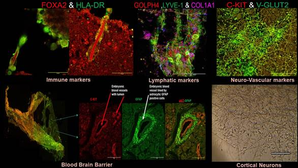
New Delhi, Feb 22 (IANS) A team of researchers at the PGIMER on Thursday said they have developed a new prototype to generate neurovascular tissues/organoids from “autologous” blood (your own blood) that can help in precision medicine.
The prototype can help develop patient-specific embryoid models (called precision medicine) for congenital neuro-sensory, neuro-developmental and neuro-degenerative diseases like autism, ADHD, ANSD, Alzheimer’s and Parkinson’s.
It can also be used for deciphering genetics and neural circuits, testing drugs bypassing the blood-brain barrier, and identifying novel biomarkers for early neurological diseases, said researchers from Post Graduate Institute of Medical Education & Research (PGIMER).
The research, funded by Anusandhan National Research Foundation (ANRF/erstwhile SERB) can produce “functional vascularised embryoids on its own and requires no guided patterning”.
It is cost-efficient as it requires no specific differential media, growth factor or differentiating morphogens for culturing, but only “autologous” plasma and blood cells.
The field of neural organoids is rapidly progressing and has fueled the hope for improved understanding of brain development and functions, modelling of neural diseases, discovery of new drugs, and supply of surrogate sources of transplantation.
“The implications are vast for studying neurological (neuro-sensory/motor and neuro-immune) disease pathways, neuro-regeneration, pre-clinical neuro-imaging, and endogenous gene editing, and autologous immunotherapies for tumours, and auto-immune diseases,” said researchers.
The researchers said they are in the process of filing a patent for the prototype at the Punjab State Council for Science and Technology, Chandigarh. They are employing these models to understand the genetic basis of neuro-sensory hearing loss and auditory comprehension challenges (altered central auditory activity) in children with congenital Sensorineural Hearing Loss (SNHL) (early onset).
–IANS
rvt/vd
Disclaimer
The information contained in this website is for general information purposes only. The information is provided by TodayIndia.news and while we endeavour to keep the information up to date and correct, we make no representations or warranties of any kind, express or implied, about the completeness, accuracy, reliability, suitability or availability with respect to the website or the information, products, services, or related graphics contained on the website for any purpose. Any reliance you place on such information is therefore strictly at your own risk.
In no event will we be liable for any loss or damage including without limitation, indirect or consequential loss or damage, or any loss or damage whatsoever arising from loss of data or profits arising out of, or in connection with, the use of this website.
Through this website you are able to link to other websites which are not under the control of TodayIndia.news We have no control over the nature, content and availability of those sites. The inclusion of any links does not necessarily imply a recommendation or endorse the views expressed within them.
Every effort is made to keep the website up and running smoothly. However, TodayIndia.news takes no responsibility for, and will not be liable for, the website being temporarily unavailable due to technical issues beyond our control.
For any legal details or query please visit original source link given with news or click on Go to Source.
Our translation service aims to offer the most accurate translation possible and we rarely experience any issues with news post. However, as the translation is carried out by third part tool there is a possibility for error to cause the occasional inaccuracy. We therefore require you to accept this disclaimer before confirming any translation news with us.
If you are not willing to accept this disclaimer then we recommend reading news post in its original language.













